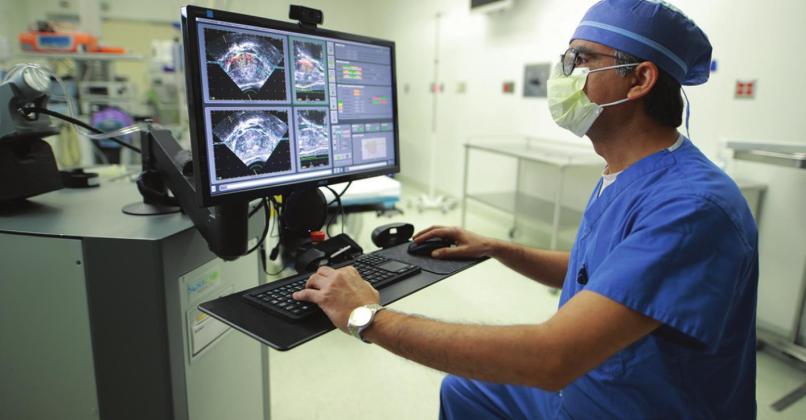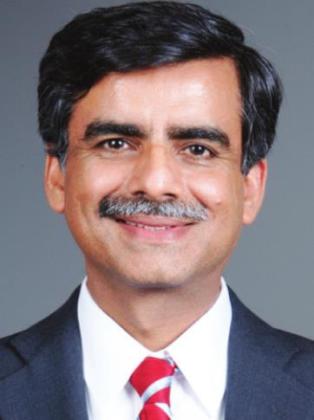THERE ARE MANY OPTIONS for preventing unintended pregnancies, some more effective than others. What most have in common, however, is that the responsibility falls largely on women.
Dr. Puneet Sindhwani, a board-certified urologist at The University of Toledo Medical Center, said that overlooks the active role that men can—and should—play in family planning. “Fertility is the result of two partners engaging. Historically because of our biases— societal, individual, and cultural— the majority of the responsibility for achieving fertility or preventing pregnancy has been offloaded to women,” Sindhwani said. “In this day and age, that needs to be corrected. That burden should be shared 50-50, and there are easy alternatives available for men to prevent unwanted pregnancy, such as vasectomy.”
Getting a vasectomy is not a decision to be taken lightly. Though sometimes reversible with surgery, Sindhwani counsels men to view the procedure as permanent. However, for men who are certain they don’t want to have children in the future, vasectomy is a good option for responsible family planning. “Vasectomy is the most effective method of contraception, with a failure rate of less than one in 2,000,” said Sindhwani, who also is chair and Kenneth Kropp Endowed Professor of Urology at the UToledo College of Medicine and Life Sciences. “That’s much better than condoms, oral contraception, and tubal ligation, which is a far more complicated surgical procedure with higher risks and a longer recovery time. It’s an easy, responsible way to ensure against unintended pregnancy.”
Vasectomies work by disconnecting the vas deferens, which is the duct that carries sperm out of each testicle. With those tubes blocked, sperm cannot exit the body. At UToledo, the majority of procedures are performed in an outpatient setting, using the latest, most effective methods. No-needle, no-scalpel vasectomy is a state-of-the-art technique available at UToledo. There are no incisions made and no needles used for injecting anesthesia. Instead, the urologist uses a high-pressure spray to numb the area. The vas deferens are then accessed through a single puncture that’s roughly the size of a grain of rice.
Because patients are given medication to reduce anxiety during the procedure, they are asked to be accompanied by someone who can drive them home.
“Vasectomy has evolved over decades to a point where it’s a ten-minute procedure with a quick recovery,” Sindhwani said. “This is a cutting-edge technique in which the pain is minimized and the return to normal activity is much quicker. Patient-reported data shows they have three times less discomfort with this technique than what they anticipated.”
A few years ago, Sindhwani was part of a study that asked patients to describe their post-procedure pain on a scale of one to 10. The average pain level was reported as 2.8, likened to an ant bite or being snapped by a rubber band. Most patients can resume normal activity within 24 to 48 hours.
UTMC also offers traditional surgical vasectomies for men who don’t want to be awake during the procedure or whose anatomy or medical history doesn’t allow for the no-needle, no-cut procedure.
Some of the most common questions Sindhwani and his fellow urologists get about vasectomy are related to concerns about sexual function after the procedure. While understandable, those fears are unwarranted. “The mechanism of fertility and the mechanism of erection are totally independent of each other. The vas tubes have nothing to do with erection, sexual desire, or testosterone levels,” Sindhwani said. “The only effect is on the ability to have children.”
Office-based procedures are performed at the UTMC Urology Clinic at Regency Medical Campus on Talmadge Road. Surgical procedures are done in the George Isaac Minimally Invasive Surgery Center at UTMC.
For men thinking about a vasectomy, Sindhwani recommends they take time to seriously consider with their partner whether they want any more children. If they have even a little doubt that they might change their mind in the future and still want to get a vasectomy now, UTMC does work with outside companies that do cryopreservation, or freezing, of sperm.
For more information or to schedule an appointment, call 419-473-3446 or 419-383-3578.
Tyrel Linkhorn is a communications specialist at The University of Toledo.



